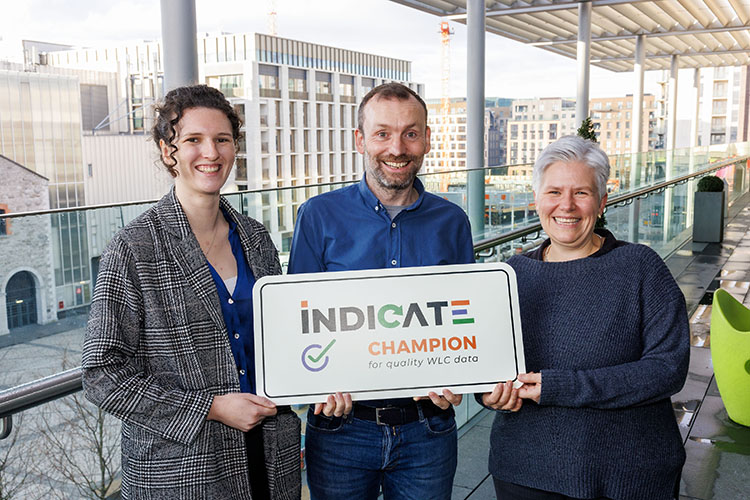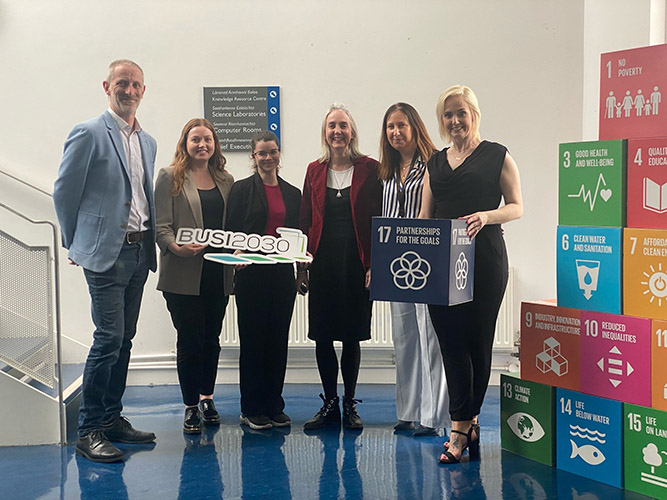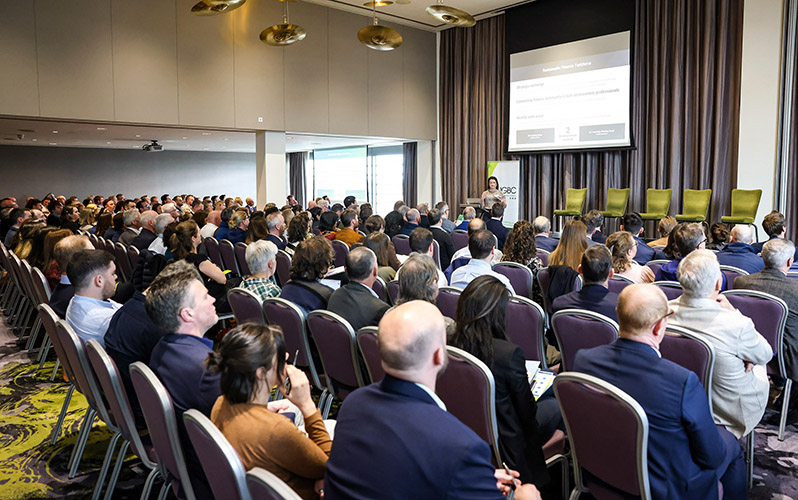
IRENE RONDINI, Communications & Marketing Lead, Irish Green Building Council, previews some key campaigns and events the IGBC will coordinate and progress in 2024.
In 2023, the Irish Green Building Council (IGBC) had another busy and successful year. The organisation’s main focus was on the implementation of our ‘Building a Zero Carbon Ireland – A Roadmap to Decarbonise Ireland’s Built Environment across its Whole Life Cycle’.
In Ireland, the construction and the built environment are directly responsible for 37% of our national emissions. The IGBC’s roadmap sets recommendations to halve these emissions by 2030 and to fully decarbonise the sector by 2050. So far, 180 companies have endorsed the document, and more than 500 professionals have enrolled for the online on-demand training courses on embodied carbon and life cycle costing facilitated by the IGBC. In 2024, the IGBC will be doing even more to stimulate tangible actions to decarbonise Ireland’s built environment.
Measure and Disclosure: A National Global Warming Potential Methodology for Ireland
Under the proposed revision of the Energy Performance of Buildings Directive (EPBD), starting in 2028, all large new buildings will have to report all life cycle global warming potential (GWP). This requirement will extend to all new buildings by 2030. The requirement is a very positive development, as addressing embodied carbon emissions is vital to reaching our climate targets.
In Ireland, many investors already require whole life carbon (WLC) assessments to provide evidence of green investments in line with the EU Taxonomy, a classification system established to clarify which economic activities are environmentally sustainable and for access to better funding terms. However, without a national methodology and a centralised national database, WLC measurements are not currently comparable.
To address this, the IGBC collaborated with the University of Galway, Construct Innovate and the Sustainable Energy Authority of Ireland (SEAI) to develop a national methodology for GWP disclosure in line with the EPBD, the EU framework for Sustainable Building Level(s) and the Standard for Sustainability of Construction Works EN 15978. The methodology includes national product generic and specific default data

As part of the ongoing INDICATE initiative, the IGBC is testing the methodology by applying it to around 50 projects in order to construct a national database of projects that represent the current carbon intensity of buildings in Ireland today. It will serve as a baseline for future targets and improvements. The initial database, kickstarted with support from IGBC’s members, includes a diverse range of 22 buildings, comprising houses, apartments, student accommodation, warehouses, hotels and office buildings. The aim is to reach 50 buildings within the next three months. INDICATE is a collaborative effort involving Construct Innovate, the SEAI, the Department of Housing and international experts.
Contributors include BDP, Clúid Housing, ECR, Grangegorman Development Agency, Henry J Lyons Architects, Helena McElmeel Architects, MMC Quantity Surveyors, Mulcahy McDonagh & Partners, PM Group, Scott Tallon Walker Architects, University of Galway, Walls Construction Limited, and Wain Morehead Architects. All of these organisations have earned the status of ‘INDICATE Champions’. If you are interested in contributing to national baselines and benchmarks by providing GWP disclosure for your project, visit www.igbc.ie/indicate-champion
WLC measurement for cities
Measuring whole-life carbon is not only important in designing buildings but also in designing our cities. The IGBC and University College Dublin (UCD) has just launched a guidance document for planners to better address emissions caused by the construction of new housing developments. More specifically, it shows that significant decreases in carbon emissions could be achieved by rethinking the use of carbon-intensive construction materials in our dwellings and adopting planning approaches that minimise car parking, new roads and infrastructure. The guidance is available at

Green skills: Developing a roadmap for the built environment
Achieving full decarbonisation in our built environment hinges on urgently having the right set of skills in place. A recent study by the Build Up Skills 2030 (BUSI2030) initiative sheds light on a critical need within the construction industry. To meet Ireland’s housing and climate targets, the industry must recruit an additional 120,000 skilled construction workers and re-skill 164,000 existing workers by 2030.
In response to this challenge, the BUSI2030 initiative, a collaboration involving the IGBC, the Construction Industry Federation (CIF), Laois and Offaly Education and Training Board (LOETB), and the Technological University of the Shannon (TUS), has created a Sustainability Skills Roadmap for the Built Environment.
Key recommendations from this roadmap include:
– The need for a collective and robust effort to cultivate a more effective and efficient construction skills ecosystem, encouraging collaboration and upskilling on a large scale
– Making zero emissions building (ZEB) fundamentals training mandatory across the sector to improve quality assurance
– Promoting green construction careers through a national campaign to engage individuals in education (primary, secondary, and tertiary levels), the existing workforce, and beyond
– Initiating a public awareness campaign to spotlight the positive measures that can be adopted to address climate and housing targets.
Going circular: Paving the way for a circular future
To cut down on embodied carbon emissions, we not only need to make better use of existing buildings, we must also make better use of materials and avoid unnecessary waste. According to the Environmental Protection Agency (EPA), the Irish construction industry is responsible for over 50% of all Irish waste.
To support the transition from a linear system to a circular economy, the IGBC is currently hosting workshops across Ireland to gather input from key players. The plan is to develop a clear and robust national circular economy roadmap. This roadmap will be launched in October and will outline the steps the construction industry can take to become more circular and, consequently, reduce carbon emissions and waste.
Spotlight on positive actions: ‘Build Green Now’ conference
An essential move in Ireland’s journey towards decarbonisation involves raising awareness on the complex subject of green building and sharing best practices. This crucial focus will take centre stage at the Build Green Now 2024 conference, hosted by the IGBC on 03 May in Croke Park. Over 300 industry leaders will gather in Dublin on that day to delve into the challenges and actions necessary for speeding up the shift to net-zero carbon buildings. If you want to join them, mark the date on your diary and keep an eye on the IGBC website for the full programme and to register
Biodiversity and climate adaptation
The activities mentioned in this article are just some examples of the IGBC’s exciting plans for 2024. The IGBC will also be diving into biodiversity and climate adaptation. Over the coming months, high-quality case studies on biodiversity and the built environment will be curated, with more work being carried out to develop recommendations on climate-safe homes.
For information on any of the initiatives and programmes mentioned in this article, visit www.igbc.ie





